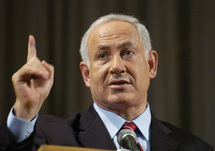
The idea would be to keep the restrictions quiet in order to minimise chances of a public uproar among rightwing Israelis.
"On the one hand, (the prime minister) is interested in showing the Americans an alternative that does not involve massive construction in the territories; on the other, Netanyahu wants to do so without having to declare a construction freeze publicly," the Yediot Aharonot daily said.
But the proposal, taken up by the the forum of seven top ministers in recent days, is unlikely to impress the Palestinians who are seeking a complete halt to settlement construction in the West Bank, including east Jerusalem.
The settlement issue is one of the thorniest in Middle East peace efforts and will figure at the new round of peace talks Netanyahu and Palestinian president Mahmud Abbas will launch in Washington on September 2.
The international community considers the settlements to be illegal, while the Israeli government faces strong pressure at home not to renew a partial, 10-month moratorium on settlement construction that expires on September 26.
In a letter sent earlier this month to members of the Middle East diplomatic Quartet -- made up of the European Union, Russia, the United Nations and the United States -- Abbas stressed that "if Israel resumes settlement activities, including in east Jerusalem, we cannot continue with negotiations."
But Israel's firebrand Foreign Minister Avigdor Lieberman insisted on Wednesday: "There is no reason to continue to freeze settlement," adding "We've done enough and we got nothing in return."
The Palestinians initially insisted they would not resume face-to-face negotiations with the Israelis unless there is a total freeze on settlement activity, but eventually agreed under US pressure to resume the direct negotiations that collapsed 20 months ago.
About half a million settlers live in the West Bank, including east Jerusalem, which Israel seized from Jordan in the 1967 Six Day War.
-----------------------------------------------------------------------
"On the one hand, (the prime minister) is interested in showing the Americans an alternative that does not involve massive construction in the territories; on the other, Netanyahu wants to do so without having to declare a construction freeze publicly," the Yediot Aharonot daily said.
But the proposal, taken up by the the forum of seven top ministers in recent days, is unlikely to impress the Palestinians who are seeking a complete halt to settlement construction in the West Bank, including east Jerusalem.
The settlement issue is one of the thorniest in Middle East peace efforts and will figure at the new round of peace talks Netanyahu and Palestinian president Mahmud Abbas will launch in Washington on September 2.
The international community considers the settlements to be illegal, while the Israeli government faces strong pressure at home not to renew a partial, 10-month moratorium on settlement construction that expires on September 26.
In a letter sent earlier this month to members of the Middle East diplomatic Quartet -- made up of the European Union, Russia, the United Nations and the United States -- Abbas stressed that "if Israel resumes settlement activities, including in east Jerusalem, we cannot continue with negotiations."
But Israel's firebrand Foreign Minister Avigdor Lieberman insisted on Wednesday: "There is no reason to continue to freeze settlement," adding "We've done enough and we got nothing in return."
The Palestinians initially insisted they would not resume face-to-face negotiations with the Israelis unless there is a total freeze on settlement activity, but eventually agreed under US pressure to resume the direct negotiations that collapsed 20 months ago.
About half a million settlers live in the West Bank, including east Jerusalem, which Israel seized from Jordan in the 1967 Six Day War.
-----------------------------------------------------------------------









 Home
Home Politics
Politics









